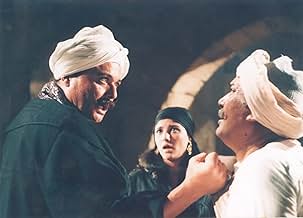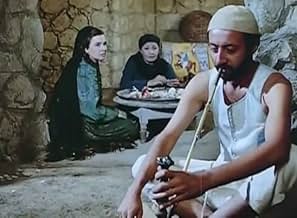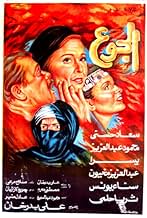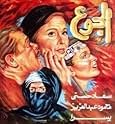Ajouter une intrigue dans votre langue
- Réalisation
- Scénario
- Casting principal
Avis à la une
While shopping in a store owned by Morrocan immigrants I found a DVD of this film. It tells an Egyptian folk story dated in 1887. These stories were revived in the roaring sixties by the Nobel prise winner Naguib Mahfouz. The Hunger portrays a village, that suffers under the reign of a greedy local tyrant and his thugs. He taxes the villagers and makes mean affairs with the rich merchants. The people long for the situation in former times, when the just and wise Fadl Gebaly ruled the village. Then Farag, an extremely strong wagoner, kills the tyrant in a fight, and by law this makes him the new ruler. Farag sympathizes with his fellow-villagers, mainly thanks to the advices of his (half)brother Gaber. Gaber preaches that an honorable man has no choice but to oppose injustice and assist the poor. There is a small love story, when Gaber marries the orphan Zebeida. The mother of Farag urges him to use his new position for personal (and her) gain. The merchants decide to integrate Farag in their milieu, and make him marry one of their daughters. His first wife is abhorred by what she sees as a lack of loyalty. Where is the good old Farag? Then Farag starts to compromise with the merchants, and his affiliation with the village people fades away. Gaber tries to mediate, and uses citations from the Koran in order to convince his brother. He also teaches Zebeida, but she doesn't understand. It is all in vain. Farag complains about his large responsibilities, and the continuing demands of the villagers. He bans his mother, when she intends to remarry. Later, when she dies, Farag finds that his earlier attachment to her has turned into stone. He makes her responsible for his earlier misery. In the meantime the village is struck by hunger due to a failing food production. The stocks in the warehouses of the merchants are still abundant, and with rising demand they see their chance to greatly enlarge their wealth. They may not have studied economics, but nonetheless realize that in an oligopoly situation they can dictate the market prices. More than ever the villagers talk about the deceased Fadl Gebaly. An aunt tells Gaber, that Fadl lives on in all of them. This gives him the idea to secretly steal from the warehouses and distribute the food among the people, playing the ghost of Fadl. Eventually he is exposed by Farag, who subsequently plans to execute him. Stirred by Zebeida, the villagers revolt, liberate Gaber, kill some of the thugs, and stone Farag. Only his first wife mourns, perhaps sensing that the circumstances had victimized his early self. The people want to make Gaber their new ruler. But Gaber opposes, declares that this burden is too heavy, and while remembering the remark of his aunt proposes to appoint a collective rule. At first the people are baffled by this idea, but soon each of them becomes enthralled. The merchants, realizing the loss of their power, march off (planning to be back). The film shots and the actors provide for a credible picture. Although it is really a charming tale, the native culture makes it difficult to identify. In particular the strong family ties and the natural order imposed by religion tend to foster solutions, that are contrary to modern western ethics. In the west this type of society started to disappear some two centuries ago, thanks to the insistence by a growing group of enlightened spirits. In the tale Gaber and Zebeida represent this enlightenment, but it looks feeble, and it might equally well have ended in religious extremism.
Meilleurs choix
Connectez-vous pour évaluer et suivre la liste de favoris afin de recevoir des recommandations personnalisées
Détails
- Date de sortie
- Pays d’origine
- Langue
- Aussi connu sous le nom de
- The Hunger
- Société de production
- Voir plus de crédits d'entreprise sur IMDbPro
- Durée1 heure 51 minutes
- Couleur
Contribuer à cette page
Suggérer une modification ou ajouter du contenu manquant



















